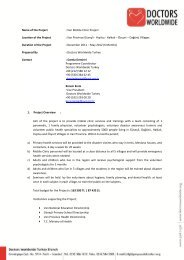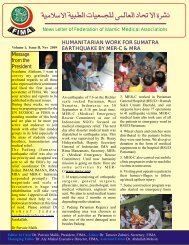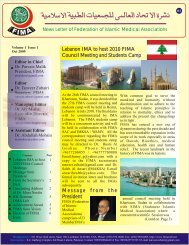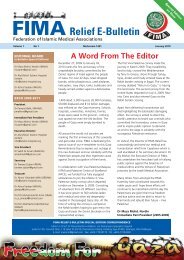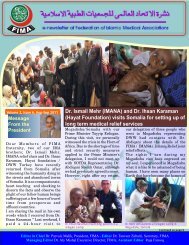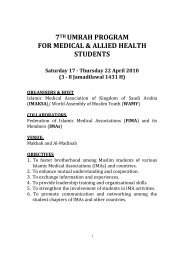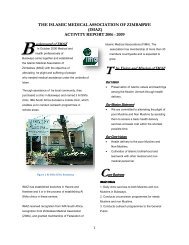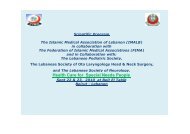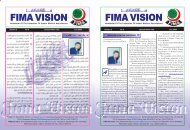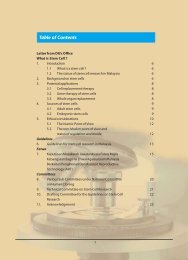FIMA Year Book 2009 - Federation of Islamic Medical Associations
FIMA Year Book 2009 - Federation of Islamic Medical Associations
FIMA Year Book 2009 - Federation of Islamic Medical Associations
Create successful ePaper yourself
Turn your PDF publications into a flip-book with our unique Google optimized e-Paper software.
Ethics <strong>of</strong> Clinical Researchor preventive benefit. This is based on arule <strong>of</strong> jurisprudence, “Public intereststake precedence over private ones.” (20)This is different from the HelsinkiDeclaration and the CIOMS guidelineswhich emphasize that individual benefitprecedes social benefits. This point needsfurther study by <strong>Islamic</strong> scholars. Theyneed to determine to what extent publicinterest supersedes individual interest asit relates to human clinical research.Guideline 10. Research in Populations andCommunities with Limited ResourcesBefore undertaking research in apopulation or a community with limitedresources, the sponsor and investigatormust make every effort to ensure thatthe research is responsive to the healthneeds and priorities <strong>of</strong> the communityin which the research will be conducted.Also, any knowledge generated or anyintervention or product developed asa result <strong>of</strong> that research must be madereasonably available for the benefit <strong>of</strong>that population or community.This guideline is consistent with the<strong>Islamic</strong> principle <strong>of</strong> justice and charity. (23)Guideline 11. Choice <strong>of</strong> Controls inClinical TrialsThis guideline can also be endorsedfrom an <strong>Islamic</strong> point <strong>of</strong> view as itrequires the researchers to observe,in dealing with human subjects, theobligation <strong>of</strong> trust when choosing themethod <strong>of</strong> intervention to protect theirhuman rights fully and ensure theirsafety. “God enjoins you to deliver yourtrust to their rightful owners.” (26)Whether the use <strong>of</strong> a placebo arm inclinical trials is ethically acceptable hasbeen vigorously debated. (30) Againstobjection by scientists, the 2000 version<strong>of</strong> the Helsinki Declaration specificallyprohibits the use <strong>of</strong> placebos except inlimited situations. CIOMS recommendsthe use <strong>of</strong> equivalency trials or add-onstudies. Equivalency trials comparean investigational intervention withan established effective treatment andproduce scientifically reliable data.An add-on design may be employedwhen the investigational therapy anda standard therapy have differentmechanisms <strong>of</strong> action. The treatmentto be tested and the placebo are eachadded to the standard treatment todetermine if the investigational therapyleads to a better outcome or to fewerside effects.If the use <strong>of</strong> a placebo arm is essentialfor the clinical trial to produce usefulinformation and there is no resultingharm to the subjects in the controlarm, it will be <strong>Islamic</strong>ally acceptable.The rationale for that is that “althougha sort <strong>of</strong> deception is practiced, theconsequences are safe.” (20) In my view,it may cause harm if the researchsubject in the control arm is deprived<strong>of</strong> a currently accepted treatment.I believe that the concerned ethicsreview committee has to carefullyexamine each specific case, evaluate thepossibility <strong>of</strong> harm to the subjects inthe placebo arm and try to work withthe investigator to find an alternativestudy design.<strong>FIMA</strong> <strong>Year</strong><strong>Book</strong> <strong>2009</strong>145




